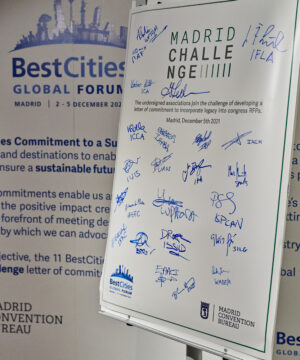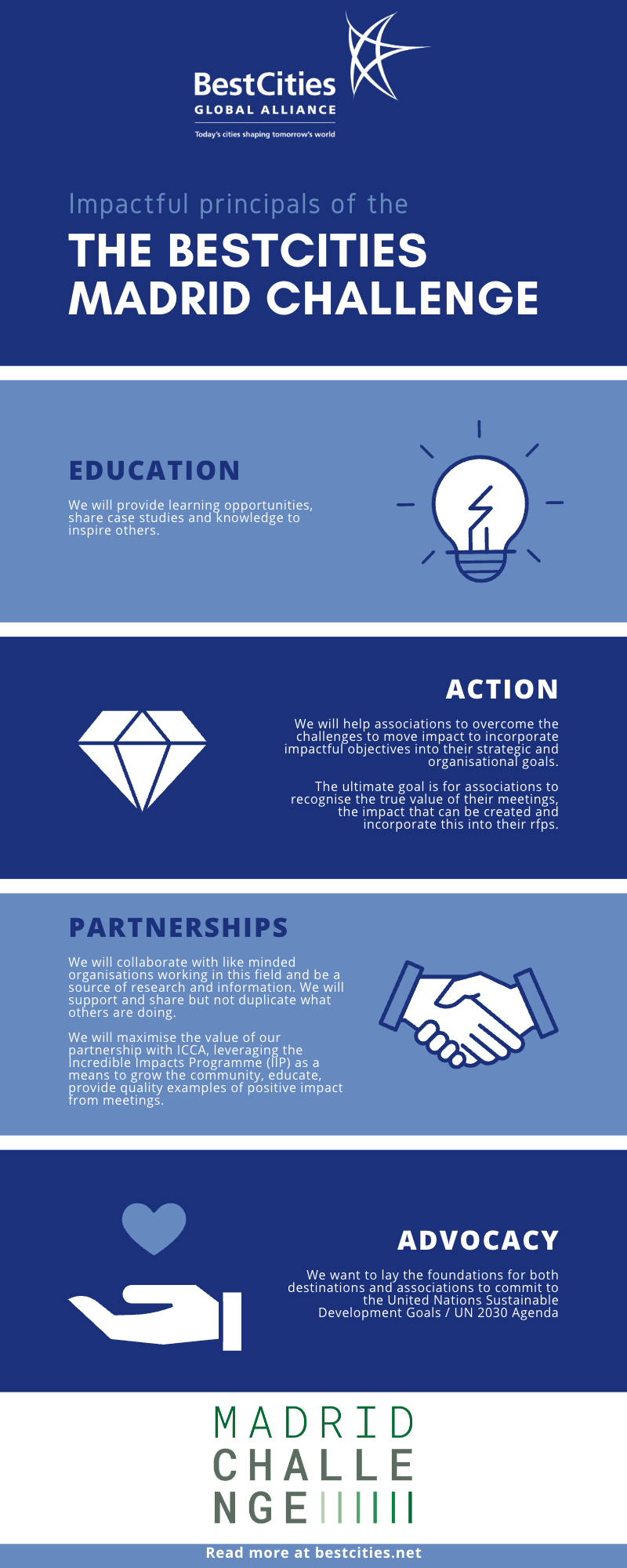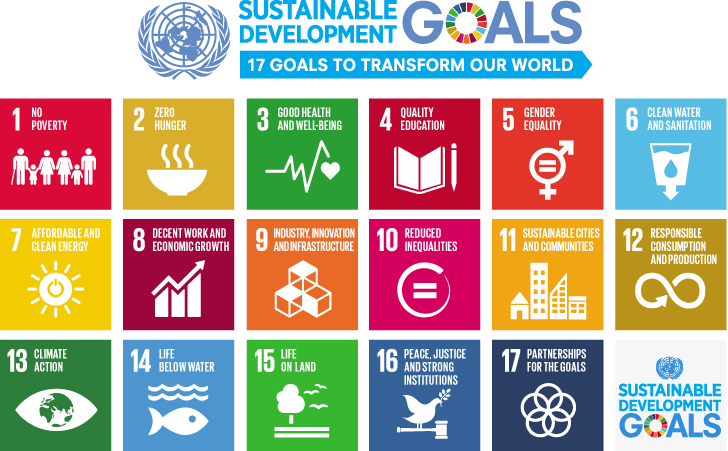The BestCities Madrid Challenge
The 2021 BestCities Global Forum, held in Madrid, Spain (December 2-5, 2021) introduced “The BestCities Madrid Challenge”, a pledge from destinations and associations to integrate impact and sustainability into daily conference planning.
Inspiration for The BestCities Madrid Challenge
The international meetings and conference sector has shown an interest in measuring events’ results beyond the scope of traditional economic metrics. Impact figures relating to hotel occupancy, tax revenue and the creation of tourism-related jobs are important, but the positive effects of a meeting go beyond these numbers.
The impact meetings have on local communities in a host destination is equally valuable in terms of knowledge exchange, improving the city's brand, increasing local research, encouraging the relocation of talent, fostering inclusion, driving academic research, and creating new business and employment relationships, among others.

The impact of an association’s meeting on its overall mission can be equally as significant. Creating a meeting with purpose can help associations with member retention and attraction, raise awareness in a particular field and attract new talent. It also provides a platform for problem solving, innovation and engagement.
In response to this industry trend, the BestCities Madrid Challenge aims to identify actionable items, and brainstorm ways to evolve industry towards a new standard where impact and sustainability are automatically incorporated into conferences and events.
What Is The BestCities Madrid Challenge?
The BestCities Madrid Challenge is a movement of destinations and associations that recognize the importance of shifting the meetings and events industry towards a more sustainable model. Collectively, these organizations have pledged to collaborate, share knowledge, and advocate to deliver a value beyond tourism through their events. Ultimately, The BestCities Madrid Challenge aims to raise industry standards by promoting impact and sustainability as key elements of organizational and event strategies.
Why Does Our Industry Need The BestCities Madrid Challenge?
The BestCities Madrid Challenge is a vehicle for destinations to deliver positive societal impacts that capture global attention. Defining and actioning The BestCities Madrid Challenge is the first step towards what will hopefully become a common thread of conversation between destinations and associations about the potential for meetings and events to positively impact society. The BestCities Madrid Challenge is also a powerful branding opportunity for the Alliance, helping to position BestCities destinations as champions of purpose-driven meetings and events.
Why Does The BestCities Madrid Challenge Focus on Sustainability and Impact?
The climate crisis is reason alone to mandate sustainability be incorporated into every meeting and event.
Impact, on the other hand, demonstrates the enduring value of our industry. By building an impact strategy, associations can start thinking differently about achievements outside of day-to-day metrics, such as number of delegates and conference profit. Impact shifts the emphasis towards events that have a deeper and more meaningful purpose.
The "How" of The BestCities Madrid Challenge
Establish a set of impactful principles to guide the movement, determine future action, deliver and measure success.

Sustainable Development Goals
On 25 September 2015, world leaders adopted a set of global goals aimed at eradicating poverty, protecting the planet and ensuring prosperity for all as part of a new sustainable development agenda. These 17 goals are called the Sustainable Development Goals (SDGs), and each one includes specific targets that must be reached by 2030.

By incorporating legacy and sustainability into meeting design, our industry can help foster development or improvement in our societies in keeping with the United Nations’ SDGs.
Proposals for Action
BestCities Partner Destinations Impact Commitments
BestCities partner destinations will:
- Actively work in partnership with their association clients, local authorities and organisations to identify environmental, social or economic areas where the business event can create a lasting positive impact on the BestCities destination visited and at the same time support the association to reach its own long-term mission.
- Work in collaboration with local recipients of positive impact actions (foundations, associations, NGOs) in each of the BestCities destinations that host our international congresses.
- Implement a positive impact culture in our associations to ensure that, in the long-term, carrying out these sorts of activities in parallel to congresses isn’t an exception, but the rule whenever an international meeting is held.
- Educate their local ambassadors/community on running a sustainable event.
- Support initiatives to create a more inclusive society via inclusive meetings by championing diversity, inclusion and equity in the organisational and occupational framework of international congresses.
- Set in place a process to quantify the impact outcomes of the meeting in proportion to the duration of the project (short-, medium- and long-term) and provide, where possible and appropriate, case studies for circulation within the industry that aim to educate and inspire others.
Associations
Impact
Commitments
Associations will:
- Work, within our individual associations and in partnership with local Convention Bureaux, authorities and organisations to identify challenges or gaps (environmental, social, economic etc.) where actions undertaken in conjunction with our Congress can have a positive impact on the host destination.
- Work in collaboration with local recipients of actions (foundations, associations, NGOs, aid organisations, hospitals, universities, research institutions, industry partners) in each of the destinations that host our international congresses.
- Commit to the continuance of impact activities from one host destination to the next.
- Engage with the host destination and its ecosystem early in the congress planning process to set impact objectives and agree on measurements.
- Implement a positive impact culture to ensure that, in the long-term, carrying out these sorts of activities in parallel to congresses isn’t an exception but the rule whenever an international meeting is held.
- Include impact as an objective in congress RFP's
- Undertake to foster, in particular, the inclusion of people with disabilities in the organisational and occupational framework of international congresses.
- Quantify the impact created by impact actions in proportion to the duration of the project (in the short-, medium- and long-term).